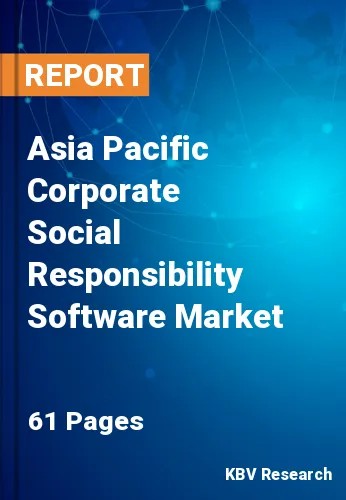The Asia Pacific Corporate Social Responsibility Software Market would witness market growth of 10.7% CAGR during the forecast period (2022-2028).
A corporation may unilaterally engage in any of these, and the failure does not exclude it from being socially responsible. Environmental responsibility is the cornerstone of corporate social responsibility, with its foundation in protecting nature. A business may guarantee that it leaves the environment better off than it found by conducting its activities as efficiently as possible and supporting relevant causes. Reducing emissions, waste, and pollution and using natural resources are common ways businesses practice environmental stewardship.
It recycles products and resources in all aspects of its operations, including customer outreach. Compensating for adverse effects by restoring natural resources or lending assistance to organizations that may help reduce the company's impact. The cornerstone of corporate social responsibility, ethical responsibility, is based on doing things just and morally. While external factors or customer demands may influence moral aims, businesses often establish standards.
Fair treatment of all clients, regardless of age, color, culture, or sexual orientation, exemplifies ethical duty. Favorable treatment of all workers, including higher than required minimum salary and benefits. This involves treating everyone equally in the workplace, notwithstanding variances in personality. Expanding the usage of vendors to include those of diverse racial, gender, veteran, and socioeconomic backgrounds. Investors are informed of operational concerns with candor and courtesy. A company may choose to manage its relationships with external stakeholders outside of what the law requires.
CSR initiative will push the country to accomplish sustainable development objectives and reshape India via public-private partnerships. Most significant businesses in Australia have social responsibility, community participation, or stakeholder engagement policies. More than half of these businesses have created policies in the last ten years. In Australia, a growing number of companies have policies and initiatives that they claim to represent their dedication to the environment, society, and the community. Hence, the introduced acts for the adoption of CSR and the inclination of businesses towards improving the environment, community, and society are expected to raise the utilization of CSR software, propelling the market expansion in the region.
The China market dominated the Asia Pacific Corporate Social Responsibility Software Market by Country in 2021, and would continue to be a dominant market till 2028; thereby, achieving a market value of $118 Million by 2028. The Japan market is estimated to grow a CAGR of 10% during (2022 - 2028). Additionally, The India market would experience a CAGR of 11.3% during (2022 - 2028).
Based on Deployment, the market is segmented into Cloud and On-premise. Based on Application, the market is segmented into Large Enterprises and Small & Medium-Sized Enterprises (SMEs). Based on countries, the market is segmented into China, Japan, India, South Korea, Singapore, Malaysia, and Rest of Asia Pacific.
Free Valuable Insights: The Worldwide Corporate Social Responsibility Software Market is Projected to reach USD 1.4 Billion by 2028, at a CAGR of 9.7%
The market research report covers the analysis of key stake holders of the market. Key companies profiled in the report include Wolters Kluwer N.V., NAVEX, Inc., Salesforce.com, Inc., Benevity, Inc., GivePulse, Inc., CyberSWIFT Infotech Pvt. Ltd., iPoint-systems gmbh, Blackbaud, Inc. (YourCause, LLC), Tennaxia and Vee Technologies (The Sona Group).
By Deployment
By Application
By Country
Our team of dedicated experts can provide you with attractive expansion opportunities for your business.

